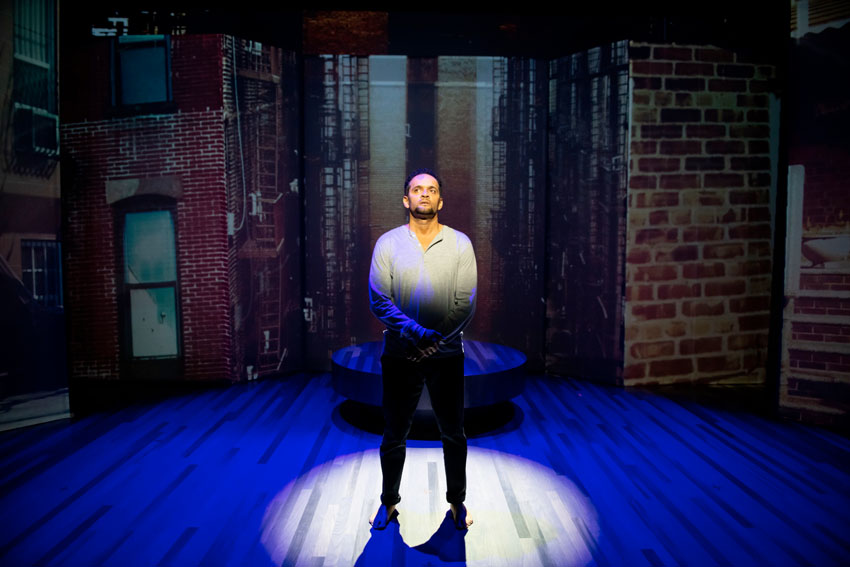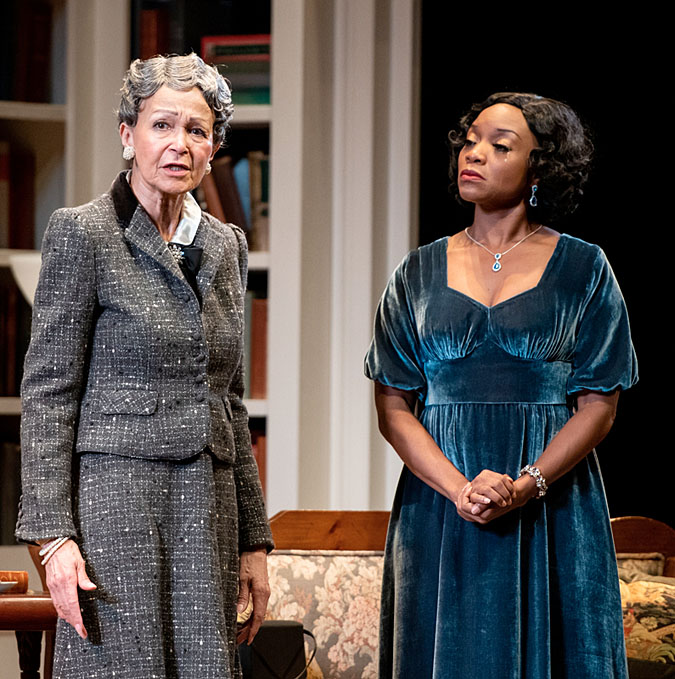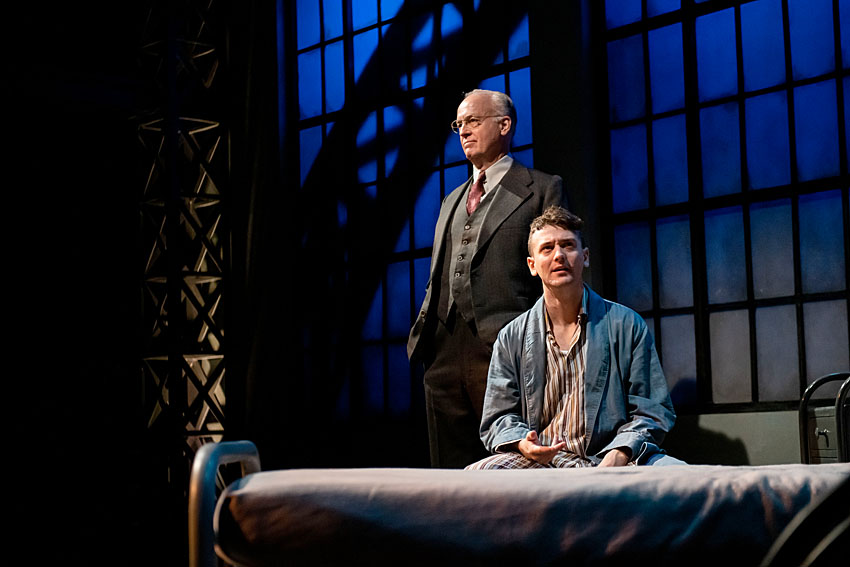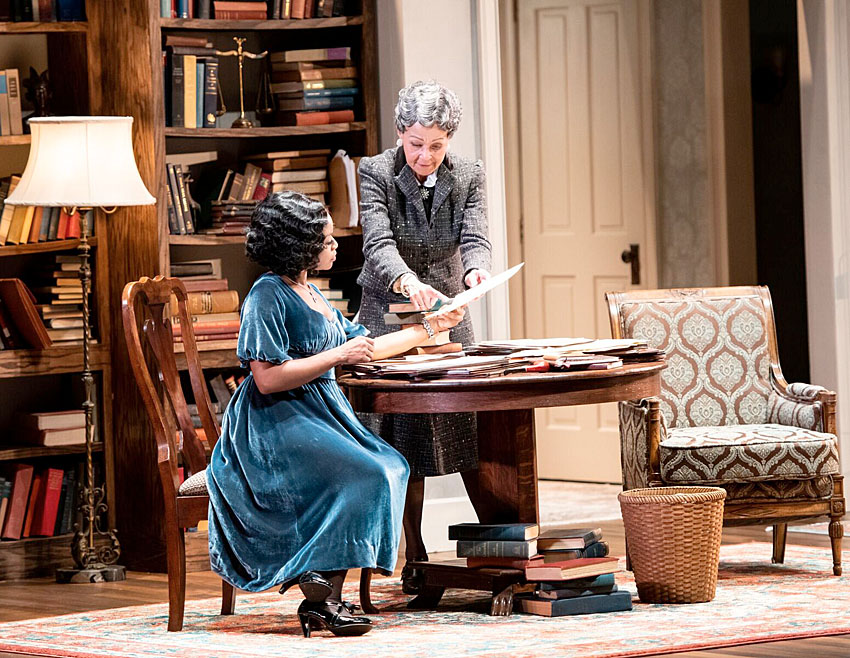“WORDS MATTER, 2019”
CONTEMPORARY AMERICAN THEATER FESTVAL’S 29th Year BRINGS NEW PLAYS TO SHEPHERDSTOWN, WV
Reviewed by Grace Cavalieri
Photos by Seth Freeman / CATF
This was my 29th year of attendance; and I always start my yearly reviews recalling the first play I saw there, on a wooden bench in the Studio Theater with a big fan circulating the only cool air. Ed Herendeen, founder/ visionary, has established several professional stages since then, making Shepherd College the site of one of the best regional theaters in America. No other experience can top the acting, the technical, and the design expertise of this theater festival.
Of the six plays presented, I attended four productions: “Antonio’s Song I Was Dreaming of a Son;” “My Lord, What A Night;” “Chester Bailey;” “Support Group for Men”

Antonio’s Song I Was Dreaming of a Son by Deal Orlandersmith and Antonio Edwards Suarez.
Directed by Mark Clements. Movement Direction/Choreography by Alexandra Beller.
This is one long poem in motion performed by Antonio Edwards Suarez, the result of a writing collaboration with celebrated playwright Orlandersmith.
The backdrop wrap-around screen projects the history and environment imaging the life of Antonio, as he speaks from his rented studio where he’s “babysitting” his five-year-old son for the day. This is the place Antonio comes to work and to fulfill his creative dreams, but he’s interrupted by a child wanting attention. The big fist shows on the screen as Antonio snaps and beats his son. This abuse of power turns to self-hatred and self-reflection: “What does it mean to be a father—what does it mean to be a son—male child of color.” This event casts Antonio back into his own childhood, half Spanish, half black, with marvelous dialogues between the two selves.
The unbroken monologue is spoken with constant sustained movement, as Edward Suarez moves through words with power and grace. By this, we learn the story of a father who sold guns, about his cruel, defeated mother, with polio, who wanted to be a dancer; and here begins the squashing of dreams, and Antonio’s struggle for identity.
Does the violence he perpetrates on the streets make him a man? Because he beat up someone? He’s a sensitive dreamy young man who’s backed away from first sex rather than violate a prostitute. His kindness is palpable and shimmers below a self-made surface of armor. This poem is the choreographed biography of a man finding himself, “the best part of himself,” who gets educated, and finally even travels to see the Russia of his dreams. All this he’s earned. But all this came, also, from a bitter unforgiving past he must always overcome; and one that’s recounted from a single weak moment, punishing his son.
Antonio Edwards Suarez negotiates the world of pain through his body, as dancer, as mime, and mover. Each part of his body encapsulates memory, and produces outward illustration of inner turmoil. Human nature is hard to describe but beautifully portrayed in this one-man tour de force, moving the soul from despair to self-realization.

My Lord, What A Night by Deborah Brevoort. Directed by Ed Herendeen.
Albert Einstein is played by John Leonard Pielmeir, Marian Anderson is played by Angela Wildflower.
We all know who Albert Einstein was, and the famed singer Marian Anderson, but we may not remember that in 1937 Marian Anderson was refused lodging in the Nassau Inn after a concert performed in Princeton, New Jersey. This brought Anderson, in this play, to Einstein’s home to accept his hospitality. With reporters pounding at the doors, the friends commence to make the best of the situation until interrupted by Abraham Flexner (Larry Paulsen), of the University’s Science Institute who insists Miss Andersons’s reputation, as well as Einstein’s, would be sullied by her stay. The subsequent action centers about whether or not the singer should try to change policy at the Nassau Inn to break the barrier and establish a precedent. She does not, throughout all events, want to make a scene, as a woman of great dignity and forbearance.
Flexner cannot have Einstein house Anderson, for the scientist’s actions affects The Institute. The practical responsibility Flexner poses is about the Jewish scholars he wishes to bring to America to save from Nazism; this is part of The Institute’s plan; and the Jews and Negroes, with plights however similar, have problems that must be separated.
Mary Church Terrell (Lizan Mitchell) enters the scene as an activist from “the National Association For Advancement Of Colored People.” She wants to further the cause, using this incident for protests. The plot is a clever entanglement among the fusty Professor, the restrained and elegant Anderson, the zealot Terrell, and Flexner whose agenda is to try to establish admission policies for Jewish students, and to ward off trouble for his plans to bring Jewish scientists to safety.
There’s new information introduced, leaked to Einstein. There’s knowledge of an atom bomb being created, adding fuel to the play’s civil rights movement, the stemming of anti-Semitism and the treatment of a genius singer by an uninformed society.
Eleanor Roosevelt resigns from the Daughters of the American Revolution when she finds of Marian Anderson refused appearance at Constitution Hall. But the First Lady’s influence allows the Lincoln Memorial to be the site of the historic concert that will forever memorialize that Easter Sunday event, two years later.
Marian Anderson’s autobiography, The book My Lord, What a Morning, inspired playwright Brevoort. And it’s always a marvel to find historical facts imbedded in the skin of history come alive, on stage, unlocking a humanity made visible, by stories sourced with credibility, imagination, accuracy. The actors are terrific, and this is a significant theater event.

Chester Bailey by Joseph Dougherty. Directed by Ron Lagomarsino.
This theater piece will last longer than all of us— a masterwork of psychology, illusion and compassion.
“No one was ready for the war in the Pacific. “
A young boy (played by Ephraim Birney) is in a hospital bed, listening to music.
In a split scene a psychiatrist (Reed Birney) talks about “trying to take the looks out of their eyes.” And so, the monologues occur, singly, until the characters merge into conversation.
So that he would not be drafted, Chester’s father got him a job in a war factory, which was a good idea, until an acetylene flame torch took out his eyes and hands. “Dying would be the best outcome,” but Chester did not die. Instead, after rounds of morphine, he accepts his place as a patient in a hospital, comforting himself with his dreams and recalling the beautiful redheaded girl he once met at Penn Station, the one who sold him a candy bar.
Chester doesn’t believe he’s lost his hands and certainly not his eyes, for he can see things that he hears. He sees white light, and through that, his surroundings. No, the staff says it’s simply auto sympathetic, and not to underestimate the brain.
Then of course, there’s the fact that he must be delusional.
That’s when a new doctor is assigned his case, Dr. Philip Cotton (Reed Birney.) His task is to prove “reality.” The doctor tries traditional approaches, with inquiries, creative alternative possibilities, methods to break delusion.
Chester will not divulge one personal secret: that his redhead from Penn station, who sold him a candy bar, has visited him.
The play evolves through a mother’s death and a father’s demise so that Chester, being alone, epitomizes the doctor/patient relationship.
When the redhead makes love to Chester one night, real physical love, sexually, it’s a precious secret he’ll hold forever.
But the truth is a horrible one, that a hospital orderly, for his degenerate pleasure, has been taking a psychotic patient to rooms to perform lewd acts.
What does the doctor do now? A man of mercy is still a physician pledged to bring patients into the conventional world we call “reality.”
The play is heightened because Dr. Cotton has been having an affair with his boss’s wife and therefore knows the weight of longing, and despair. He also knows about how temporary love is. And unlike others who may have previously attended Chester, he knows the human heart. Cotton makes up a life and a name for Chester’s love, and so assists the fantasy. In fact, he allows that “Alice, a nurse” can visit “and hold his hand.” Sweet lies to let someone have his dream.
The world is made of imagination, and this playwright asserts its many truths.
This work is of the highest caliber, tackling the sources of happiness, the edges of tragedy and loss, danger and salvation. Heart and beauty are clearly, lyrically connected to the word. For my personal taste in theater, this play reaches the greatest height of creative satisfaction.

Support Group For Men by Ellen Fairey. Directed by Courtney Sale.
Four men --Roger (Scott Aiello;) Brian (Chris Thorn;) Delano (Ken Robinson;) Kevin (Juan Arturo)— are drinking wine in what will be “a sacred space” for their weekly ritual. Holding the “talking stick” (a decorated baseball bat) allows one to speak his truth, using a Native American guise. “Running Buffalo” goes first, talking about his wife’s fibroids; “Floating Squirrel” sometimes feels he doesn’t exist, and by the way, digital sensors work for others but not him; “Sleeping Hawk” says everything is good with him and his girlfriend, Amber. Next, there will be a two-minute meditation; and then “Silver Eagle” shares his news that he hasn’t had sex in a month, and might get promoted in his job. Kevin goes on to disclose his various sexual preferences that ramp up a dialogue of curiosity, outrage, and jealousy.
Outside, there’s a fight beneath the window, and police enter he apartment to get more information. Officer Nowak (Tom Coiner) and Officer Caruso (Julia Coffey) are wonderful critics of the pink wine and the talking stick-- until more ruckus outdoors causes the entire group to exit the apartment.
But all is not the same when the group tries to recover its purpose. The object of all the fights happens to be a man, dressed in drag, who tumbles out of the closet where he was hiding for safety.(Alex is played by Rolando Chusan.)
This is the core of the play with issues of choice, identity, preference, and the right to wear women’s clothing and still be a man.
More of the men ‘s own lives are revealed: Macho Roger admits to anxiety attacks; another’s afraid of dying; a third, is tired of being “the black friend.” And; to commemorate all this truth telling, weed comes out of a secret box that “will make you open and beautiful and free.”
What a fabulous scene we’re are given with their psychedelic “trip,” colors and music, lights and dancing.
Police show up again, to our continuing pleasure.
And so, the play resolves, as the characters determine what they really want, in one hilarious helping after another.
Speaking into the stick has a surprising delightful conclusion, ending a night of fun from the first word spoken until the last.
Grace Cavalieri is Maryland’s Poet Laureate. She founded and produces “The Poet and the Poem” for public radio, now from the Library of Congress. Her latest play, “Quilting the Sun,” opens August, 2019, the New Theater Of New York.
CATF runs through July 28. (304-876- 3473 or 800-999 -CATF)

Comments
This site is beautifully appointed by Dan Murano
Thank you, Grace.
Thank you, Grace. You captured the essence of each play and gave readers a sweet sample of the delights at CATF. "Chester Bailey" was my absolute favorite...a gorgeous and profound play.
Cavalieri’s carefully focused reviews bring me into the audience where I can catch a glimpse of the smart, sad, funny, challenging human dramas created by CAT playwrights and performers.
Such delicious reviews. Thank you, Grace.
Add new comment